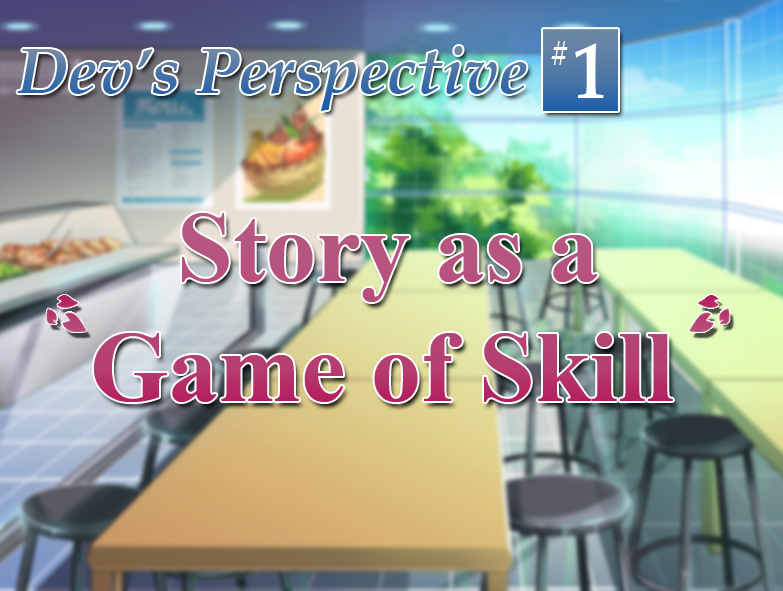
The rise of visual novels on Steam and the new popularity of narrative-focused games have progressed games as a medium, however, there is the reoccurring question:
Is it truly a game?
This is interesting as many might consider some visual novels as games and others as not. What’s the difference? One question comes to light: Is it a game of skill? We’ll explore this question and perhaps come closer to an answer.
How can story be about skill?
There are two general ways that the story itself (in isolation from other game mechanics) can be about skill: perceiving the story and influencing the story.
When I say perceive I’m not talking about a surface understanding, I’m talking about the ability to read between the lines as a form of skill. One only needs to look to the Ace Attorney games for a prime example of this. Can you figure out the contradiction in a person’s testimony?
Influencing the story is about taking the game rules (which may or may not come from the story) and using them to alter the events in the story. Technically, quick time events (QTE) kinda count, however, Mass Effect and Deus Ex: Human Revolution are better examples. An NPC’s personality counts as a game rule. If you understand the character’s personality then you can better influence them.
Why are visual novels sometimes not considered games?
The more traditional visual novels (especially Japanese commercial ones that sell well) aren’t really designed to be interactive. They let you choose which side character gets to become the main character in their story. This allows you to explore each character’s story more in-depth than the traditional linear format.
There is a common route which would be considered the trunk of the story, and there’s also separate character routes that start when the common ends. To access that character route you usually need to faithfully trigger that character’s events. In old visual novels you had to “save scum” to do it, whereas modern ones now use icons or other means to indicate which choices trigger which character’s events.
For the traditional visual novel you aren’t intended to be challenged. Why? Because players would just look up all the correct answers on the internet, bypassing the challenge of finding those choices. Visual novel developers realized this, but seeing as how players stopped complaining and sales were still good, there wasn’t a reason for challenge.
This works well for getting the best story experience and reduces the barrier between the story and player. However, someone who’s treating it as a game will search for the “gameplay”, get frustrated, and quits, even though visual novels were never designed with that in mind.
Then there are visual novels which don’t follow that framework, and sometimes get a negative impression from veterans of the genre as a result. Why? Because it prevents them from accessing the story, but traditional gamers favour it more because it gives the challenge that they desire.
The hybrid visual novel
One game that successfully uses story as gameplay is Long Live the Queen by Hanako Games. It mixes stat-based gameplay with visual novel elements. Hence, the hybrid visual novel.
You play as a princess soon-to-be crowned Queen after her mother passes away, however, many people want her dead both within and outside the kingdom. The question is, why do they want the princess killed and does this have anything to do with her mother’s death?
In Long Live the Queen understanding the story is key. Sometimes considered the Dark Souls of visual novels, the game is filled with skill checks which dictate whether you pass or fail certain tasks. Knowing when, how and under what conditions each story event happens will help players survive.
As you can imagine, the standard way of following a walkthrough doesn’t work here, that’s because the skills you train are related to the story. If a walkthrough tells you to build up your military skills over a certain point of time, then you know that something military-related is going to happen in the future. Although non-linear in scope, making a walkthrough that is completely spoiler-free would be really hard.
Show me your skills
When players argue about whether something is a game, they usually mean skill-based games. Story can test a gamer’s skills, but many visual novels were not designed to be tests of skill in the first place. This is the reason why “walking simulators” may not be considered games by some as well.
However, like Long Live the Queen, there are more visual novels being released that feature story as skill-based gameplay. Slowly but surely more players will start to see that story and gameplay can coincide and offer a fulfilling experience outside of industry norms.